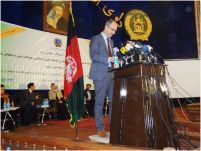 World Health Day, commemorating the founding of WHO, is celebrated on 7 April each year, but due to the elections was celebrated on 9 April 2014 this year in Kabul, Afghanistan.
World Health Day, commemorating the founding of WHO, is celebrated on 7 April each year, but due to the elections was celebrated on 9 April 2014 this year in Kabul, Afghanistan.
The theme of this year's day was vector-borne diseases. In her address, the Minister of Public Health H.E. Dr Suraya Dalil highlighted the health toll and economic burden imposed on people by vector-borne diseases and the WHO Representative Dr Rik Peeperkorn focused specifically on malaria and leishmaniasis, the two most prevalent vector-borne diseases in Afghanistan. He highlighted the the progress and achievements made by the national control programme and partners.
Malaria
Based on 2013 malaria data, since 2007, Plasmodium vivax cases have decreased from over 85 000 confirmed cases to around 44 000 in 2013. The proportion of falciparum cases has decreased from 20% in 2002 to 5% in 2013. The data show that 80% of confirmed cases were reported from Nangarhar, Kunar, Laghman, Khost and Zabul provinces; these provinces should be prioritized for more effective control measures. No falciparum cases have been reported from six endemic provinces, namely Samangan, Hirat, Parwan, Kunduz, Nimroz and Panjsher in 2013.
The efforts of the national control programme have resulted in a decreased burden of malaria. In some provinces of the northeast, northern and western regions a significant reduction, particularly in falciparum malaria, has been noted. In view of the changes in malaria epidemiology in the northeast, northern and western regions, the programme should be reoriented towards elimination in mentioned regions, and since the eastern and southern regions are still under risk of malaria and present a high burden of disease in the county, thus, malaria control efforts should be accelerated and intensified in the eastern and southern regions.
Leishmaniasis
Leishmaniasis remains a public health concern, especially in Kabul, which remains the world capital of cutaneous leishmaniasis with over 15 000 new reported cases in 2012, and 19 million population at risk of the disease in 21 endemic provinces out of 34. Unfortunately, there is lack of financial sources to support the effective control of this social stigmatizing disease in Afghanistan.
In Afghanistan, cutaneous leishmaniasis mainly affects the poorest groups of the population and, if not promptly treated, can lead to disfiguration and disability which poses a high social burden, resulting into stigma and marginalization, particularly among women.
Using the opportunity of World Health Day, the WHO Representative requested all donors and supporting agencies to support Afghanistan's leishmaniasis control programme.
Key messages
- The burden of vector-borne diseases must not be under estimated. Commitments must be sustained and efforts accelerated to control and eliminate these diseases.
- Good epidemic preparedness and response, and a strong surveillance system, in addition to the availability of proper and rapid diagnosis and effective treatment, are required to save lives.
- To control vector and vector-borne diseases, collaboration between the Ministries of Public Health and Agriculture, municipalities and other concerned sectors are needed, to implement more integrated vector management programme.
- Communities have a critical role to play in raising awareness of actions individuals can undertake to prevent vector-borne diseases, such as keeping the environment clean, using personal protection such as insect repellent, sleeping under bednets, covering water containers, getting rid of stagnant water and so on.


